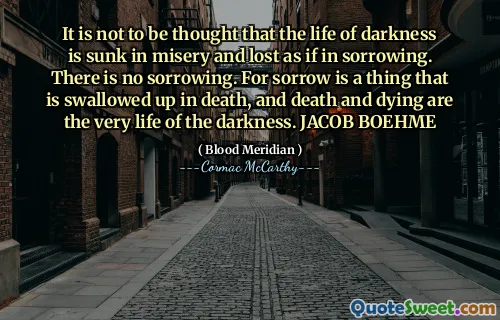The Mennonite watches the enshadowed dark before them as it is reflected to him in the mirror over the bar. He turns to them. His eyes are wet, he speaks slowly. The wrath of God lies sleeping. It was hid a million years before men were and only men have power to wake it. Hell aint half full. Hear me. Ye carry war of a madman's making onto a foreign land. Yell wake more than the dogs.
The passage depicts a Mennonite character who reflects deeply on the nature of humanity and the potential for destruction within. As he observes himself in the mirror, he conveys a sense of urgency and foreboding about mankind's ability to invoke chaos. His mention of the "wrath of God" suggests a powerful force lying dormant until awakened by human actions, highlighting the gravity of their choices. The dramatic imagery emphasizes the consequences of violent conflict on foreign lands, and the underlying madness driving such wars.
As he speaks, his words call for awareness and responsibility, warning that their actions could stir something much darker than anticipated. His assertion that "Hell ain't half full" reflects a belief that humanity's capacity for evil is vast and unfulfilled. The Mennonite's plea is a reminder of the moral weight that comes with warfare, inviting listeners to understand the ripple effects of their deeds. This passage captures McCarthy's themes of violence, morality, and the complicated nature of human existence.






